
Picked up this book in a random fit of interest in a Birmingham bazaar; since then, this tome occupies pole position in my List of Books I Will Read Again without a bribe. I count many travel books among my inspirations for relentless travel; most of the Tintin books fit snugly in this category. Now, to that bookshelf, we welcome Peter Moore.
He wrote the book/planned the travel post-breakup with a long-term girlfriend; in his own words, he needed to "get away from it all" and rediscover singlehood without the trappings of society breathing down his neck. He, aptly, picked Africa, easily one of the most lawless lands known to Lonely Planet conoisseurs, to drown his sorrows; little did he know that the Sudanese embassy would eat him up all the way.
All throughout, he enters the mythical kingdom of Lesotho, still untouched by tourist litter; he gets a guided tour round a Jo'burg shantytown, easily the place with the highest proportion of shootings per capita; he tries to climb the highest mountain in Africa, to the consternation of everyone around him, not least his guide, who doesn't get his tip; and has a rollickin' fun time all the way.
Sure, I agree with other reviewers that the funny streak vanishes sometimes, but one has to bear in mind good travel writing is far and few between, and the bar has to be lowered accordingly. Bear in mind that most tourist sights have been worked and reworked by countless fledgling journalists trying to ape their way onto the colour pages of each broadsheet's Travel pullout. With focused competition like this, one simply cannot compare.
To his credit, his narrative takes in a LOT of educational soundbites - much is made of the history and culture of the places he travels through, and one gets the feeling this is less a George Bush than a Michael Moore travelogue. Many genuinely funny bits abound, mind you - his attempts to get that elusive Sudanese visa, with long distance phone calls from various (badly telecom-linked, may I add) parts of Africa back to a Sudanese embassy in Malawi that has already given up all hope on him, complete with respective abusive language, are some of the best bits of travel writing I have read all year.
Thumbs up, Peter Moore - you get that 9/10. This is one of the truly inspirational travel books of our time, mateys. (He's Australian, by the way, like nearly all good travellers are.)

